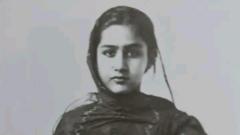
Princess Abida Sultaan was an extraordinary woman who defied traditional expectations of Muslim women in early 20th-century India. Born in 1913 into the ruling family of Bhopal, she was a remarkable princess who challenged societal norms from a young age.
Raised by her grandmother, Sultan Jehan, Abida was groomed to be a ruler with a unique upbringing. She was encouraged to be equal to boys, learning sports, music, and horseback riding while also performing household chores. From age nine, she drove a Rolls-Royce, shot tigers, and was an accomplished polo player. She explicitly rejected the practice of purdah, refusing to be confined by traditional gender restrictions.
At 15, she became heir to the throne and ran her father’s cabinet for over a decade. Her childhood was characterized by remarkable freedom, with her family believing that girls should have the same opportunities as boys. She could ride, climb trees, and participate in any activities she chose.
Her personal life was equally unconventional. At 12, she was married to Sarwar Ali Khan, a childhood friend and ruler of Kurwai. However, her marriage was short-lived and tumultuous. In her autobiography, she candidly described her discomfort with marital intimacy and the subsequent breakdown of her marriage.
In a dramatic moment that showcased her fierce independence, Abida once confronted her husband during a custody dispute. In March 1935, she drove three hours to his home, entered his bedroom, and threatened him with a revolver, effectively ending the custody battle and allowing her to raise their son as a single mother.
Abida was also politically engaged, attending round-table conferences where she met prominent leaders like Mahatma Gandhi and Jawaharlal Nehru. She witnessed the violent partition of India in 1947, experiencing the deteriorating relationship between Hindus and Muslims firsthand.
A particularly traumatic memory was her experience at a railway station, where she discovered a train full of dead Muslim refugees, an incident that ultimately influenced her decision to move to Pakistan in 1950.
In Pakistan, she continued to be a champion of democracy and women’s rights. Her legacy is one of breaking barriers and challenging societal expectations. Despite facing increasing religious politics that have somewhat diminished her recognition, she remains a significant historical figure.
Journalist Shams Ur Rehman Alavi notes that while her legacy might be less prominently discussed today, her name is unlikely to be forgotten. In Bhopal, she is still remembered by her nickname ‘bia huzoor’, a testament to her enduring impact.
Princess Abida Sultaan passed away in Karachi in 2002, leaving behind a remarkable story of courage, independence, and defiance against societal norms.








